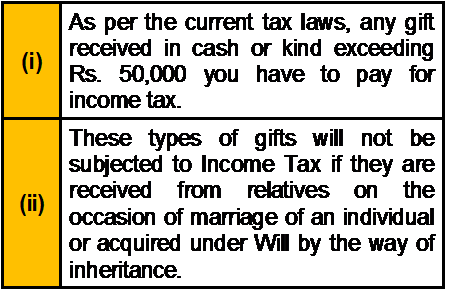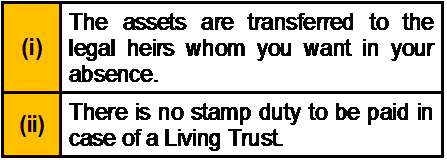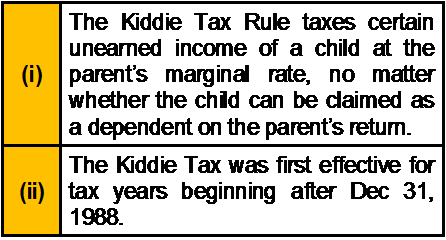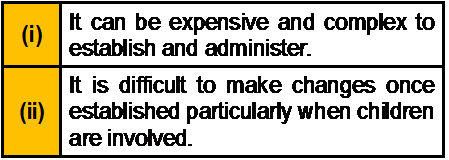Topic 3: Volume C
______________ of the Income Tax Act provides for the registration of a Charitable Trust. _____________ of the Income Tax Act contains the provision that the profits and gains of the business carried on by a charitable trust would be fully exempt from tax if it is attains the objects of the trust.
A. Section 12A, Section 11 (4A)
B. Section 11A, Section 12 (4A)
C. Section 12A, Section 11 (2A)
D. Section 11A, Section 12 (2A)
Which of the following is/ are disadvantage(s) of a Will?

A. All of the above
B. Only (iv)
C. Both (ii) and (iv)
D. None of the above
Which of the following statement(s) is/are correct?

A. Only (i)
B. Only (ii)
C. Neither (i) or (ii)
D. Both (i) and (ii)
______________ of the Transfer Property Act permits the transfer of property only to one or more living persons.
A. Section 1
B. Section 5
C. Section 8
D. Section 10
Which of the following is/are ancillary benefit(s) of Discretionary Family Trust?

A. All except (i)
B. All except (ii)
C. Only (iii)
D. All of the above
Which of the following is/are advantage(s)of Living Trust?

A. Both (i) and (ii)
B. Neither (i) or (ii)
C. Only (i)
D. Only (ii)
Which of the following statement(s) about Socities Registration Act is/are correct?

A. Both (i) and (ii)
B. Only (i)
C. Only (ii)
D. Neither (i) nor (ii)
A written instrument is necessary when a Trust is created in relation to an immovable property of the value of ______________ and upwards.
A. Rs 1,00,000
B. Rs. 100
C. Rs. 10,000
D. Rs, 10,00,000
______________ of Income Tax Act,1961 provides for the Registration of a Charitable Trust.
A. Section 12A
B. Section 13A
C. Section 64A
D. Section 65A
Which of the following statement(s) about ‘Kiddie Tax’ is/are correct?

A. Only (i)
B. Only (ii)
C. Neither (i) or (ii)
D. Both (i) and (ii)
A trust which is created and operating during the Grantors lifetime is called________________
A. InterVivos Trust
B. Express Trust
C. Either of the above
D. None of the above
Which of the following is/are disadvantage(s) of Trust?

A. Only (i)
B. Only (ii)
C. Neither (i) or (ii)
D. Both (i) and (ii)
| Page 17 out of 40 Pages |
| Previous |